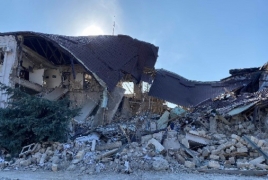Human Rights Watch: Azerbaijan's unlawful strikes in Karabakh December 12, 2020 - 16:38 AMT PanARMENIAN.Net - Azerbaijani forces carried out apparently indiscriminate attacks in Stepanakert in violation of the laws of war during the conflict in Nagorno-Karabakh, Human Rights Watch said Friday, December 11. A Human Rights Watch on-site investigation in Stepanakert, Nagorno-Karabakh’s largest city, found numerous incidents in which Azerbaijan’s forces used inherently indiscriminate cluster munitions and artillery rockets or other weapons that did not distinguish between military targets and civilian objects. Evidence relating to an attack on October 4, 2020, indicates that multiple strikes hit residential homes in less than a minute suggesting possible bombardment – treating the whole area as a military target – which is prohibited under the laws of war. Azerbaijani forces also attacked infrastructure that may have an unlawfully disproportionate impact on the civilian population. The use by Armenian and local Nargono-Karabakh forces of military bases and dual-use infrastructure in Stepanakert placed the civilian population unnecessarily at risk. Human Rights Watch visited Nagorno-Karabakh in October and November and spoke to 19 civilian residents of Stepanakert, two officials from the local authorities, a nongovernmental organization worker, and four other residents who had fled to Armenia but who were present during the fighting. Human Rights Watch also acquired and analyzed satellite images taken between September 27 and late October that corroborate accounts, photographs, and videos of repeated Azerbaijani air and ground attacks in Stepanakert, including scores of damaged structures and impact sites. Human Rights Watch was able to examine a small number of the attack sites in Stepanakert. Human Rights Watch found that, in addition to the attacks on military targets, Azerbaijani forces attacked residential areas with inherently indiscriminate weapons and dropped aerial munitions and fired heavy artillery into populated areas that contained no apparent military objectives. Such attacks are indiscriminate, violating the laws of war, because they do not distinguish between civilians and civilian objects and military targets. Warring parties should also refrain from using explosive munitions with wide-area effects in populated areas because they cause both immediate and long-term harm to the civilian population. During the on-site investigations, Human Rights Watch documented the use of explosive weapons with wide-area effects in six areas of Stepanakert, damaging and destroying homes, businesses, hospitals, schools, and the local water supply, and significantly harming critical infrastructure to deliver electricity and natural gas and the telecoms network. Authorities said a total of 192 Azerbaijani troops were killed and 511 were wounded during Azerbaijan’s offensive. In 2023, the Azerbaijani government will increase the country’s defense budget by more than 1.1 billion manats ($650 million). The bill, published on Monday, is designed to "eliminate the shortcomings of an unreasonably broad interpretation of the key concept of "compatriot". The earthquake caused a temporary blackout, damaged many buildings and closed a number of rural roads. Partner news |